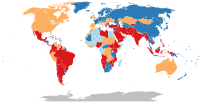
Photo from wikipedia
The COVID-19 pandemic has caused difficulties in the organization of clinical classes for nursing students. It is therefore important to explore students’ experiences related to participation in clinical classes during… Click to show full abstract
The COVID-19 pandemic has caused difficulties in the organization of clinical classes for nursing students. It is therefore important to explore students’ experiences related to participation in clinical classes during the pandemic and to draw conclusions that will allow for the introduction of innovations enabling the development of the required professional competencies as part of training during current and future pandemic restrictions. In this study, we aimed to explore the experiences of nursing students related to clinical education during the COVID-19 pandemic and to identify practical implications for this education in the future. A qualitative study was performed based on individual interviews among Polish nursing students (n = 20). The study is reported using the COREQ checklist. Content analysis was applied, and five main categories were identified, including ‘the key role of clinical mentor’, ‘theory-practice gap’, ‘ambivalent emotions and ethical challenges’, ‘to be part of the team’, and ‘strengthened professional identity’. The results of our research indicate that higher education institutions should implement clear strategies to support students, both in terms of psychological support and compensation of professional skills, the development of which might be limited during the pandemic. Modern technologies, including medical simulations, virtual reality, artificial intelligence, and telemedicine should be used in the practical teaching of nursing students to educate them on how to cope with difficult, new situations, build decision-making skills, and solve problems.
Journal Title: International Journal of Environmental Research and Public Health
Year Published: 2022
Link to full text (if available)
Share on Social Media: Sign Up to like & get
recommendations!